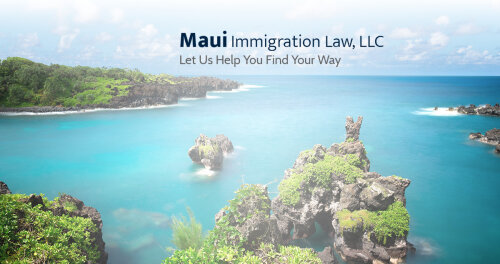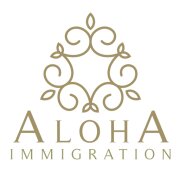Best Dependent Visa Lawyers in Hawaii
Share your needs with us, get contacted by law firms.
Free. Takes 2 min.
Or refine your search by selecting a city:
List of the best lawyers in Hawaii, United States
About Dependent Visa Law in Hawaii, United States
A Dependent Visa allows family members of individuals in the United States on certain nonimmigrant visas to live in the country for the duration of the primary visa holder’s stay. In Hawaii, which is subject to federal U.S. immigration law, this process is similar to other states, but unique local factors such as cost of living, multicultural communities, and logistics related to island residency can impact the application and adaptation process. Dependent Visas include categories like H-4 (dependents of H-1B workers), F-2 (dependents of F-1 students), L-2 (dependents of L-1 intra-company transferees), and others. Understanding the legal requirements, maximum duration of stay, and rights and obligations of each dependent visa is crucial for families wishing to remain together legally in Hawaii.
Why You May Need a Lawyer
Engaging a lawyer with experience in dependent visa cases can make a significant difference in the outcome of your application or ongoing status. Here are common situations in which people may need legal assistance with dependent visas in Hawaii:
- You are unsure about your eligibility for a dependent visa or which category applies to you.
- Your family’s situation is complex, such as stepchildren, adopted children, or blended families.
- Your application has been denied or delayed and you wish to appeal or resolve the issue.
- You need help understanding your rights to work, study, or access healthcare as a dependent in Hawaii.
- Changes in the primary visa holder’s status (change of employer, change of status, etc.) affect your visa.
- You are facing expiration or renewal issues and are concerned about overstaying or accruing unlawful presence.
- You experience legal concerns, such as allegations of immigration fraud or misrepresentation.
An experienced immigration lawyer can help you navigate these processes, avoid costly mistakes, and ensure compliance with federal and local regulations.
Local Laws Overview
Dependent visa laws in Hawaii follow the federal immigration statutes and regulations enforced by bodies such as USCIS and the U.S. Department of State. However, certain aspects of living in Hawaii can affect dependent visa holders:
- Work Authorization: Some dependent visa categories, such as H-4 spouses of H-1B visa holders with an approved Form I-140, may be eligible for work authorization, while others are not allowed to work at all.
- Education: Hawaii recognizes dependent visa children in its public school system, but college enrollment may require proof of lawful status and may influence tuition rates.
- State Documentation: To obtain a Hawaii State Identification Card, drivers license, or public benefits, dependent visa holders must provide proof of lawful presence and local address.
- Family Law Interactions: Marriage and custody issues impacting dependent status must be addressed according to Hawaii’s family law and may affect your immigration standing.
- Healthcare Access: Hawaii has unique state programs but access for dependent visa holders is often limited to private health insurance unless otherwise qualified.
While federal law is the foundation, local practices and requirements can affect documentation and daily life for dependent visa holders.
Frequently Asked Questions
What is a dependent visa?
A dependent visa allows spouses and children of primary visa holders to legally join and reside with them in the United States, with specific eligibility and rights based on the visa category.
Who qualifies as a dependent?
Generally, qualifying dependents include the spouse and unmarried children under the age of 21 of the primary visa holder. Extended family such as parents or siblings are not typically eligible as dependents.
Can dependent visa holders work in Hawaii?
Only some dependent visa holders may work. For example, H-4 spouses with certain approvals and L-2 spouses may qualify for work authorization. F-2 and many other dependent categories cannot legally work.
Can my children attend public schools in Hawaii?
Yes, dependent visa children are generally allowed to attend K-12 public schools in Hawaii. Admission to public colleges and universities may have additional requirements.
How do I renew or extend a dependent visa?
Extensions and renewals depend on the primary visa holder’s status. You must file the necessary forms and supporting documentation with U.S. Citizenship and Immigration Services or through the U.S. consulate if applying from abroad.
What should I do if my dependent visa is about to expire?
Begin the extension process as early as possible and consult a qualified immigration attorney if you anticipate any delays or complications to maintain legal status and avoid accruing unlawful presence.
What happens if the primary visa holder loses status?
If the primary visa holder’s status is revoked or expired, dependent visas are generally invalidated or end soon after. Immediate legal advice is recommended in this situation.
Can I travel outside the United States on a dependent visa?
Dependent visa holders may travel, but re-entry requires valid travel documents and visa stamps. Consult your attorney to avoid complications with re-entry or inadmissibility.
Do I need to prove my relationship to the primary visa holder?
Yes, you must provide official documents such as marriage or birth certificates to establish your relationship to the primary visa holder when applying for a dependent visa.
How long can I stay in Hawaii on a dependent visa?
Your stay is typically tied to the primary visa holder’s status and period of stay. Overstaying can have serious immigration consequences, so track your expiration dates carefully.
Additional Resources
Several resources and organizations can help you with dependent visa matters in Hawaii:
- U.S. Citizenship and Immigration Services (USCIS) - For forms, instructions, and status checks
- Hawaii State Department of Human Services - For inquiries on state identification, public school enrollment, and limited public benefit programs
- Local legal aid organizations such as the Legal Aid Society of Hawaii - Assists eligible individuals with immigration issues
- Hawaii State Bar Association - Can refer you to qualified immigration attorneys in your area
- University of Hawaii system - For guidance if you are an F-2 dependent of an F-1 student
- U.S. embassies and consulates abroad - For dependent visa applications or renewals while outside the United States
Next Steps
If you need legal assistance regarding a dependent visa in Hawaii, start by gathering all pertinent documents related to your current visa status, proof of relationship, travel history, and any notices from USCIS or other authorities. Contact a licensed immigration attorney who practices in Hawaii or a qualified legal aid organization. An initial consultation can help assess your unique situation and outline the best path forward to maintain compliance, achieve your family’s goals, and resolve any visa-related complications.
Always remain proactive about monitoring your visa status, renewals, and eligibility for work or education, and seek trusted advice before making major changes in your circumstances.
Lawzana helps you find the best lawyers and law firms in Hawaii through a curated and pre-screened list of qualified legal professionals. Our platform offers rankings and detailed profiles of attorneys and law firms, allowing you to compare based on practice areas, including Dependent Visa, experience, and client feedback.
Each profile includes a description of the firm's areas of practice, client reviews, team members and partners, year of establishment, spoken languages, office locations, contact information, social media presence, and any published articles or resources. Most firms on our platform speak English and are experienced in both local and international legal matters.
Get a quote from top-rated law firms in Hawaii, United States — quickly, securely, and without unnecessary hassle.
Disclaimer:
The information provided on this page is for general informational purposes only and does not constitute legal advice. While we strive to ensure the accuracy and relevance of the content, legal information may change over time, and interpretations of the law can vary. You should always consult with a qualified legal professional for advice specific to your situation.
We disclaim all liability for actions taken or not taken based on the content of this page. If you believe any information is incorrect or outdated, please contact us, and we will review and update it where appropriate.
Browse dependent visa law firms by city in Hawaii
Refine your search by selecting a city.









